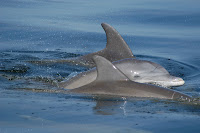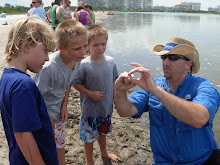Yesterday, I was up in Sarasota helping to facilitate an Aquatic Species Collecting Workshop at Mote Marine Laboratory. Tim Oldread, who is the Director for School and Public Programs at Mote was the lead instructor, and kind enough to let me tag along. This fall I plan to begin offering the workshop in Naples, but first had to "co-facilitate" a session with an experienced facilitator. The aquatic species collection permit is offered through FWC and the Florida Marine Science Educators Association and is an excellent opportunity to Florida educators to collect and possess aquatic species for their classrooms or programs.
The workshop is available to certified Florida teachers and/or employees of educational centers. Certificate holders are eligible to collect specified aquatic species for educational purposes that would be restricted under fishing license guidelines. This Educator Certification is valid for 3 years.
During the training workshop, participants discuss collecting alternatives, benefits, collection and transport techniques, methods to minimize environmental impact, restrictions imposed by the Collecting Certificate, available resources, and related activities. Its also a great opportunity to meet and network with other educators!!!Yesterday, we concluded the workshop by doing a little sampling of our own using seine and dip nets. Some of our catch included pinfish, mojarras, pipefish, emerald parrotfish, spot, planehead filefish, shrimp, and blue crabs.












































